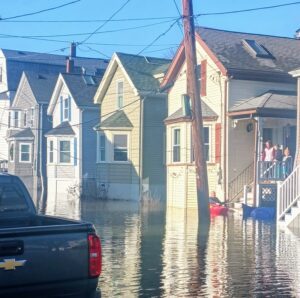Who is a member?
Our members are the local governments of Massachusetts and their elected and appointed leadership.

Following flooding throughout Salem due to a storm in January 2024, the city is partnering with InnSure to develop a flood resilience assessment to better aid residents in flood mitigation and protection. (Photo courtesy Paul Tomchyshyn)
In January 2024, a seawall in Salem’s Juniper Point neighborhood failed during a winter storm and king tide, sending icy seawater rushing through streets and inundating homes. The storm flooded properties around Collins Cove and the Point, areas that had never seen flooding of this scale before.
The unprecedented storm event underscored the reality that coastal communities face in combatting the impacts of climate change. For the city of Salem, experience with damaging storms has created a need for solutions to protect residents in the face of rising climate risks.
Salem has partnered with the QBE North America Foundation and InnSure, a Cambridge-based nonprofit, to participate in a free flood resilience pilot program. The program, expected to launch near the end of 2025, aims to lower flood risk throughout the city by using home resilience audits, expand insurance access, and reduce expenses for the city and its residents.
InnSure looks to build insurance and risk-financing mechanisms for climate-challenged communities and sustainable energy projects that help to manage associated risks.
Salem was selected to participate in the program due to the significant flood risks facing the community from both the ocean and local waterways.
“As a city, we’re taking a pretty aggressive stance around how we can build up public infrastructure … and all the tools that are at our disposal to think about how we can manage those impacts,” said Salem Mayor Dominick Pangallo. “Where there’s a gap is with our private property — homeowners, business owners. People that own property along the waterfront often lack access to a lot of the same resources that the city has.”
Recent storm events in particularly vulnerable areas of Salem caused city staff to look at existing infrastructure. But, Pangallo said, “Property owners in those areas are really on their own. We wanted to do something about that.”
The path to partnering with QBE and InnSure came out of the Massachusetts Coastal Communities Alliance, a 21-community coalition initiated by Pangallo in 2024.
Dr. Karen Hamilton, an associate professor of accounting and finance at Bridgewater State University who teaches risk management and assessment, reached out to city staff following the coalition announcement. She discussed the city’s ideas, including resiliency audits and insurance solutions, and connected city staff with InnSure.
“We brought up this idea that we’d been talking about internally about having home resiliency audits and having those somehow tied to insurance that people are either eligible for or the cost of the insurance that they’re paying for,” said Neal Duffy, Salem’s director of sustainability and resiliency.
Duffy said Salem’s pilot program is inspired in part by the MassSave program, which provides free energy usage audits for homeowners and renters and identifies cost-saving opportunities.
“The idea is, can we reduce costs, reduce expenses in the long term, reduce the financial impact on the city, protect the taxable property value of those properties?” Pangallo said.
Steve Brandt, InnSure’s chief development officer, said the audit would target specific interventions that property owners and residents in vulnerable areas can take to protect themselves from flooding events. That information would be used in tandem with existing data to determine measurable benefits from different mitigation efforts.
InnSure would then communicate the audit findings to insurance partners to see what additional measures might be needed to create insurance solutions for areas at risk of flooding. These could include insurance discounts, group or parametric insurance options for neighborhoods, or a self- or mutual-insurance approach for communities.
Brandt said the company aims to develop a method for calculating total cost of risk for vulnerable communities like Salem, which could be used to develop mitigation and resilience measures.
“These [storms] are hyperlocal situations, and the insurance industry is just not geared to operate like that,” Brandt said. “We really believe that if we’re going to get out of this crisis, it’s a community-up approach.”
Pangallo stressed the importance of intersecting values in the partnership between Salem and InnSure, as well as the power that coalitions like the Massachusetts Coastal Communities Alliance can have in addressing common issues.
“I’m hopeful that if this pilot works in Salem, that other coastal communities will make use of it,” Pangallo said.